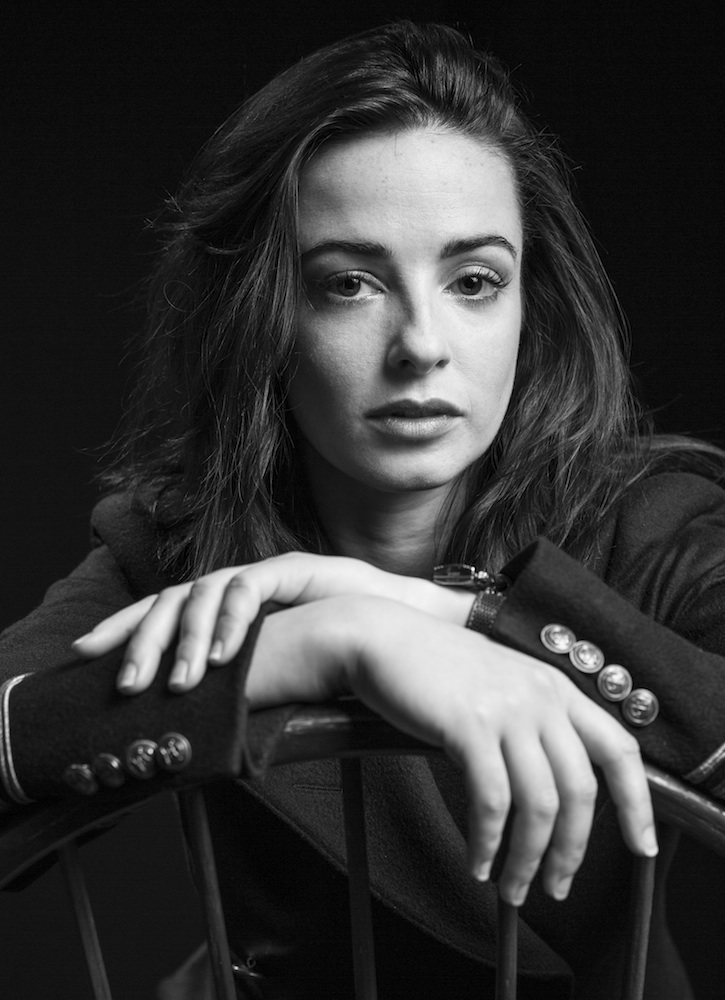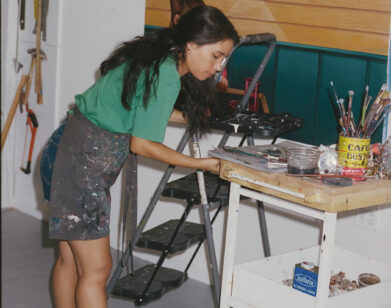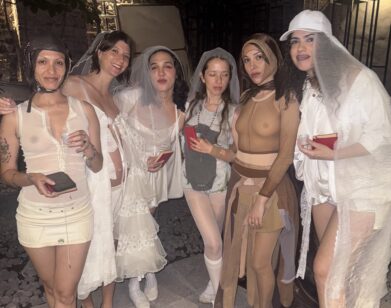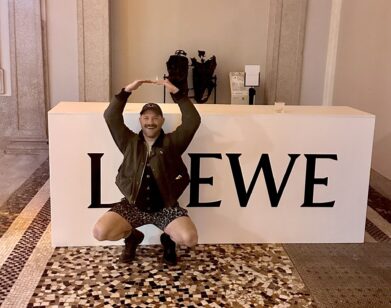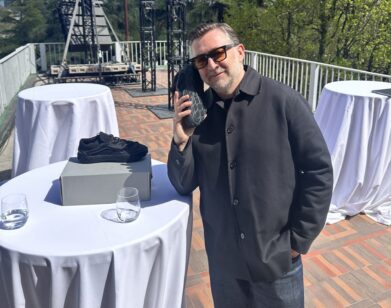Laura Donnelly’s River Dance
ABOVE: LAURA DONNELLY IN NEW YORK. PHOTOS BY FRANK SUN. MAKEUP: STEFANIE WILLMANN FOR RMS BEAUTY AT SEE MANAGEMENT. HAIR: GARETH BROMELL FOR ORIBE HAIR CARE AT SEE MANAGEMENT.
Inserted into the program of The River, Jez Butterworth’s new Broadway play, is a poem by W.B. Yeats, “The Song of the Wandering Aengus.” In it, the narrator waxes about a transcendent experience while trout fishing—a freshly caught fish is transformed into a flighty woman, a “glimmering girl.” In the play’s opening scene, trout fishing is mythologized once again in lyrical form, this time when Hugh Jackman’s unnamed protagonist, The Man, reads a poem by Ted Hughes to his new girlfriend, The Woman. Alone in his uncle’s old cabin, The Man attempts get The Woman to join him fishing, but she is reluctant. Finally she agrees, and they disappear. When the couple returns, however, The Woman, played by Cush Jumbo, has been replaced. Instead, there is The Other Woman (Laura Donnelly), more passionate and more flirtatious in manner.
The Man seems equally infatuated with both women—he professes his love for each one of them as passionately as he speaks about trout fishing—and yet, it seems clear that neither will last past the weekend. They are too clever, and The Man, sending each one to fetch a memento from a box containing another woman’s picture, seems bent of self-sabotage, conscious of his own underlying insincerity.
The River first debuted at the Royal Court Theatre in London in 2012 with Dominic West starring as The Man. Belfast-native Laura Donnelly is the sole original cast member to resume her role on Broadway. Although Donnelly has spent a good portion of her career onstage in London, she was recently the object of Jamie Dornan’s murderous obsession in the first season of Netflix’s The Fall, and currently plays Jenny Fraser on Outlander, Starz’s cult time-traveling fantasy series set in the Scottish Highlands.
EMMA BROWN: You first did The River in 2012 in London. I didn’t realize that it only ran for three weeks.
LAURA DONNELLY: The Royal Court then—not so much now ’cause they’ve got a new artistic director—they always did three week runs. It was all about new writers and new plays, and the plan was always, if they do well, to move them onto another venue, possibly the West End. That was always the plan for our play. It just didn’t happen to work out because of availabilities of the other actors. Then Hugh Jackman showed interest and it just seemed to make much more sense to bring it out here instead. But it’s such a pleasure to get to do it a second time.
BROWN: It doesn’t feel strange to get back into the rhythm of the play with a new set of people?
DONNELLY: Not at all. It just feels like a different production. I was concerned about that; I’ve never done that before. I’ve never revisited a play, even with the same cast—never mind a different cast—but our director, Ian Rickson, has done that a lot. He did it a lot with Jez [Butterworth], our writer. Jez’s last play, Jerusalem, they had done in four different versions. The first one was at the Court; the second was in the West End. It was brought over to Broadway and then it went back to the West End again. Each time there was a little reshuffling of casting and Ian just started from scratch. He said, “Don’t worry about it. Don’t think about it, just treat it like a whole new thing.” And that’s what I did, so it genuinely feels that way. I’ve discovered whole new things to it, to my character and to the play itself as a whole that I didn’t have the first time around.
BROWN: Did you ever consider switching characters—playing The Woman instead of The Other Woman?
DONNELLY: No. [laughs] I became immediately attached to The Other Woman. I did, in my very, very first audition back in 2012, read for The Woman first. We were given a choice of which one we wanted to read for when we came in. I read for The Woman and immediately Ian said, “I think you’re much more Other Woman. I want you to come in tomorrow and read for her.” From that moment, I saw he was absolutely right. And I just really fell in love with the character. Even had I been given a choice, there’s no way that I would have swapped.
BROWN: What made you choose The Woman first?
DONNELLY: I thought that I was more similar to her in who I was, and possibly in the past I had been, but my life had been getting to a point where I was tipping much more into the character of The Other Woman, and Ian Rickson seemed to spot that in me before I did. I guess that newer side of me—things I was learning as I was growing up—was really informing my audition and vice-versa. The character of The Other Woman as I went on to work on it informed me just as much, and had as much of an effect on my life as well. We kind of became one. [laughs]
BROWN: Is it normal for a character to have such an impact on you?
DONNELLY: No, not such an impact. There are always lines that blur whenever you’re involved in such an intense process. Any rehearsal process—I find, anyway—does have quite an effect on me and I very much live in that world for the whole period of time that I’m involved with the production. But normally, afterwards with a little bit of space I can come right back out of it again. That didn’t so much happen this time around. I think it’s the nature of the play; it just taught me a lot of how I wanted to be living my life.
BROWN: How has the audience been on Broadway compared to at the Royal Court?
DONNELLY: [In London] our audience was a very specific one because we put the play on Upstairs at the Royal Court, which is the tiniest space. We had about 85 people in there a night, even if that, and so it was a very different atmosphere. Because it was a Jez Butterworth play post-Jerusalem, there was a lot of buzz around it and they had to do it in such a way that the tickets were given out on the day, so it was very intense. The Broadway audiences are incredible. Something Hugh Jackman had told us before we had had any previews, was that he thinks that the Broadway audiences are the most intelligent, and I completely agree with him. You have this real sense that they are with you in every single word, every line, they get everything, they’re listening so intently and they are just willing you. You can feel it from them. Then the response that we get afterwards, the direct response in terms of the applause—they’re on their feet—it’s so kind. I think it is the most wonderful atmosphere.
BROWN: Another actor once told me that at his agents’ Christmas party, all the women make a beeline for Dominic West.
DONNELLY: [laughs] He has a charm, he definitely does. I adore him. He’s such a nice guy, but he has this real ability to not take himself too seriously and I bet that’s what the women are attracted to.
BROWN: Did audiences react differently to Dominic West than they do to Hugh Jackman? When I saw the show, the audience went nuts as soon as Hugh Jackman walked on.
DONNELLY: That’s not a British audience thing to do at all.
BROWN: It’s quite unsettling.
DONNELLY: It certainly was for us the first time. Hugh was aware of the fact that this was a possibility, so we had discussed what might happen in terms of delivery of the lines at that point. Then he walked on stage for the first preview and exactly that happened. It’s a really crazy thing for me and for Cush to witness, because it’s such a quiet little play—it’s not like he’s coming on to do a number. I would expect that kind of entrance applause in a musical, obviously; they would do that in the UK. But it’s great! It’s Hugh Jackman. People really want to see him and they’re so excited and that’s why they’re there. If they want to applaud, then brilliant.
BROWN: What was your fist ever role in primary school?
DONNELLY: As with all Irish-Catholics, it would have been the nativity play—I was a sheep—when I was about five. But throughout my childhood I did a form of Irish dancing that was kind of the precursor to Riverdance. It was a mixture of ballet and Irish dancing that my teacher, Patricia Mulholland, had invented, essentially. It was Irish ballet and she would create performances based around the myths and legends of Ireland. From about the age of eight, I was on stages and theaters in Northern Ireland playing the kids’ parts in those. It was never speaking, but it was this form of dance that told those stories, so I got a lot of experience of just being on stage and that’s absolutely where the theater bug bit.
BROWN: You went to the Royal Scottish Academy of Music and Drama. What made you choose Scotland for drama school?
DONNELLY: It was a mixture of a couple of things. I had spent a lot of time there on holiday with my family. My family developed this love affair—that I think was mostly driven by my mum—with Scotland. Then I knew that if I was going to pursue acting as a career, I was probably going to have to spend the rest of my career in London. I thought, “I might as well experience somewhere else first before I have to move down there,” so Scotland seemed to be the right choice. I had known somebody who had studied at the RSAMD and had absolutely loved it. That was the only drama school I applied for. It was the only one I was interested in going to.
BROWN: What do your parents do? Are they creative?
DONNELLY: No, I don’t come from a particularly creative family. I think my mum would have loved to have gotten into something, probably dance, but she came from a very, very small town in rural Ireland right in the heart of the Troubles and really didn’t have those kinds of opportunities. It wasn’t a realistic option for her. She had moved to Belfast at about 16 or 17 to be a nurse and my dad was a doctor and that’s how they met. She’s got a creative spirit and that’s definitely where I get it from.
BROWN: Do you feel like Northern Ireland is well represented in the arts?
DONNELLY: Probably not as well represented as the other cities in the UK, but I think that’s a lot to do with its history and the difficulty of the last 50 years or so. But it’s developing so much quicker I think than anywhere else, so it has a really good future ahead of it.
BROWN: I feel like, before The Fall, every film or television show I had seen set in Northern Ireland or Belfast was about the IRA.
DONNELLY: Absolutely. That was the joy of reading that script the first time—that’s why I really wanted to be involved in it. It wasn’t the usual story, it was showing a different side of Belfast and really placing it as if it could be any other city in the UK or Europe. And I think—not that we want to forget everything that happened, ’cause we’ve learned so many lessons and it’s made us the country that we are, it’s brought us humor and understanding and sensitivity and many other things—but to have an opportunity to put ourselves out there like any other city, I think is really lovely.
BROWN: Where is Outlander filmed?
DONNELLY: Outlander is filmed mostly around Glasgow and the central belt of Scotland, so it’s lovely for me because I get to go up and spend time in the place that I lived for three years. I’ve got a bunch of friends in the cast because a lot of them studied at the same college as I did, and I get to see my family, most of whom now live in Scotland. It’s a perfect job in that location sense.
BROWN: Do most of the people you studied with live in London?
DONNELLY: A bit of a mixture. Not everybody continued with acting. Some gave up straight away; they decided they wanted to pursue a different area of the industry or get out of the industry completely. But for those of us who are still acting, I would say maybe half of us are in London and half in Scotland. If you are actually Scottish, as an actor there’s a really great industry. They have a brilliant theater scene, they do a lot of filming, and you can really make a career out of being a Scottish actor in Scotland. I think the ones who moved down tended to be the ones who weren’t originally from Scotland.
BROWN: Was a Scottish accent something that you had to master in drama school?
DONNELLY: We certainly were taught aspects and we were required to do it in productions, but it’s not something I ever had to sit down and really concentrate on. To be honest, accents are one of those things for me, personally, that usually come quite naturally by just listening to the people. Living there for three years, it just came naturally. When it came to Outlander, we had to specify it to the highlands a little more, so I did have to do a bit of vocal lessons with a dialect coach there. But not much, it was a case of just tweaking it in certain ways to kick it up further north of the country.
BROWN: Sam Heughan, who plays your brother on Outlander, was someone who you studied with as well, right?
DONNELLY: Yes, he was the year above me in college, so we’ve known each other a good decade.
BROWN: Had you kept in touch?
DONNELLY: Yeah, he lived near me in London for a long time and I would see him on and off. As actors, you’re always working elsewhere, and you’re constantly saying, “Let’s meet up for a catch-up and a coffee,” and it doesn’t happen from everybody’s schedules. But I had seen him on and off over the years and then we did a film in Norway together called Heart of Lightness during the summer just before we started Outlander. He’s just great–so much fun to be around. He’s such a lovely guy.
BROWN: Were you both already signed on for Outlander when you were filming in Norway?
DONNELLY: He had just been cast and it got announced while we were doing the filming in Norway, which was crazy. He suddenly got the effect of the Outlander fan base. [The day it was announced] we were sitting on set and his Twitter followers were going up by tens of thousands by the minute. It was crazy! I think at that point I had auditioned once, but I hadn’t been cast. I think I got cast after we got back from Norway.
THE RIVER IS CURRENTLY IN PERFORMANCES AT THE CIRCLE IN THE SQUARE ON BROADWAY.

